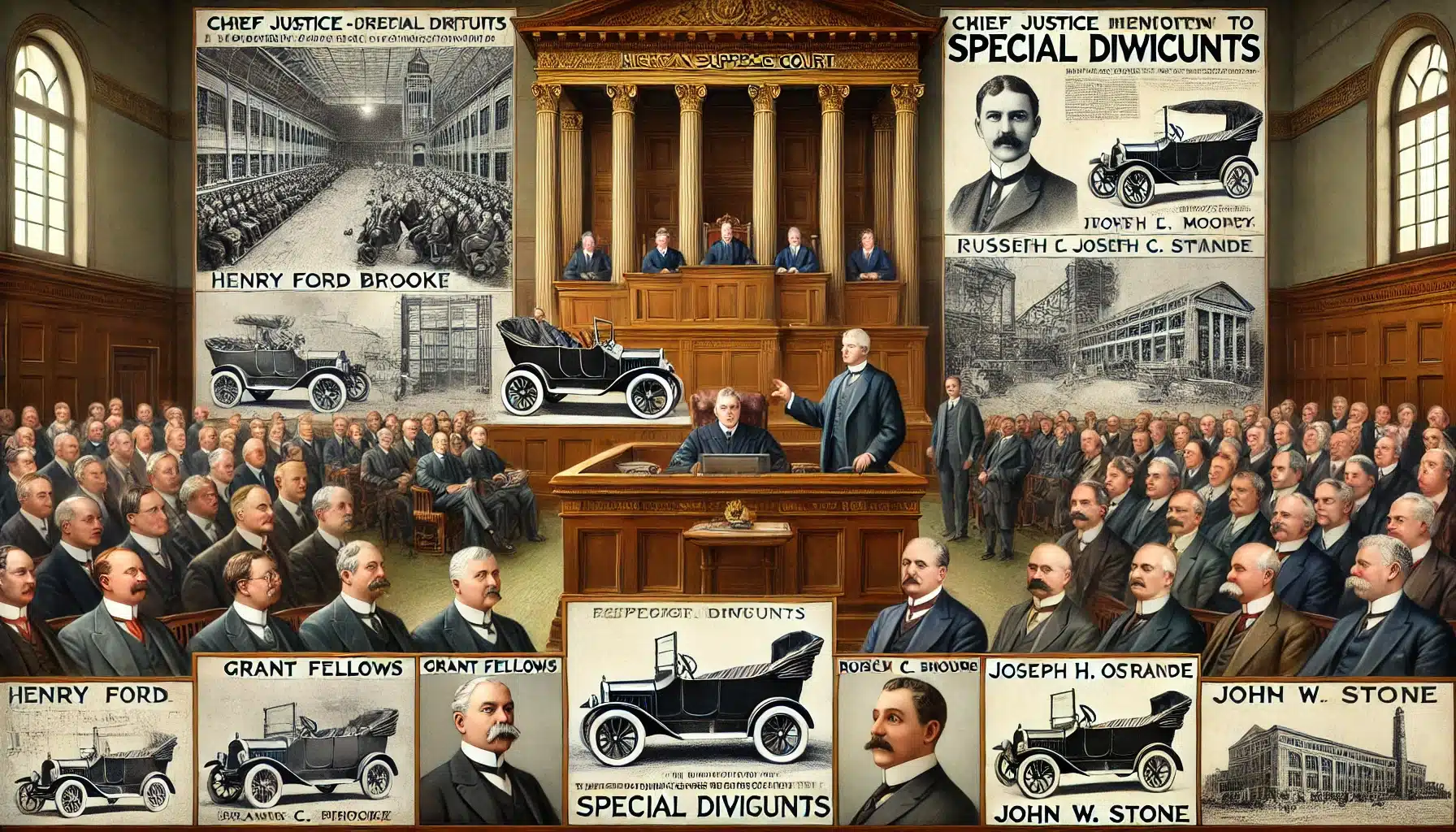This case cleared that if shareholders have rights to dividends from corporate profits then directors also have broad discretion to use those profits for lawful business expansion efforts deemed beneficial for the company’s future.

Best way to automate statutory/referential drafting
Citation: 204 Mich. 459, 170 N.W. 668, 3 A.L.R. 413 (Mich. 1919)
Court: Michigan Supreme Court
Date of Judgment: 7th February, 1919
Bench: Chief Justice John E. Bird, Justices Flavius L. Brooke, Grant Fellows, Frank C. Kuhn, Joseph B. Moore, Russell C. Ostrander, Joseph H. Steere, John. W. Stone.
Facts
- Under Henry Ford’s direction, the Ford Motor Company (defendant) had experienced expansion and success. Despite lowering the prices of cars, Ford’s profits increased, leading to substantial special dividends paid out to shareholders, The Dodge brothers, who had a minority investment in Ford and operated their own auto company, were among the owners who received significant special dividends from Ford.
- Henry Ford declared in 1916 that he would no longer be paying special dividends, choosing to put his future profits in growing the business, bringing down car prices, and creating jobs. The Dodge brothers protested this new policy, claiming that Ford’s new course was not in the best interests of the stockholders and that it was their right as owners to receive these dividends.
- The dispute escalated when Ford decided to invest in a smelting plant, further indicating a shift from dividend payments to reinvestment. The Dodge brothers filed suit, seeking to reinstate special dividends and prevent the construction of the smelting plant. The lower court ruled in favor of the Dodge brothers, ordering Ford to pay a special dividend and enjoining the construction of the smelting plant. Ford appealed the decision, leading to this case being heard by the Supreme Court of Michigan.
Decision of the Supreme Court
The 1919 Michigan Supreme Court affirmed the lower court’s decision regarding the payment of dividends but reversed the decision enjoining Ford from building the smelting plant. The court held that while shareholders have rights to dividends from corporate profits, directors also have broad discretion to use those profits for lawful business expansion efforts deemed beneficial for the company’s future. The court also noted the business judgment rule, which gave Ford a wide mapping on how to run the company.
Court held on several points that, Directors and Authorities of a company have a fiduciary duty to act in the best interests of shareholders. This duty requires them to prioritize maximizing shareholder value within legal constraints. The court emphasized that while corporations can engage in charitable activities or pay fair wages to employees, these activities should not compromise the corporation’s ability to pay reasonable dividends to its shareholders.
The court clarified that the primary purpose of a corporation is to generate profit for its shareholders, and any actions taken by directors must be in line with this purpose. Decisions that prioritize other interests, such as charitable contributions, must not conflict with this fundamental duty.
Key legal issue discussed
1. Whether Plaintiff shareholders can force Defendant to increase the cost of the product and limit the money invested into expansion in order to pay out a larger dividend?
No
Plaintiffs are entitled to a more equitable-sized dividend, but the court will not interfere with Defendant’s business judgments regarding the price set on the manufactured products or the decision to expand the business. The company’s goal is to generate profits for its owners, and the defendant is keeping money that may be distributed to the owners in an arbitrary manner. Interestingly Ford did not deny himself a large salary for his position with the company in order to achieve his ambitions. However, the court will not question whether the company is better off with a higher price per vehicle, or if the expansion is wise, because those decisions are covered under the business judgment rule.
A company’s directors have the power to declare dividends and to determine the amount and timing of such dividends. Courts will not interfere with these decisions unless there is evidence of fraud, bad faith, or an abuse of discretion that constitutes a breach of good faith towards shareholders.
The court ruled that the directors of a company hold discretionary power over dividend declarations and investment decisions. This discretion allows directors to prioritize business expansion and development over immediate shareholder returns if they believe it benefits the corporation’s long-term interests. The court emphasized that such decisions should not be overridden unless there is clear evidence of misconduct or abuse of power.
Henry Ford’s decision to reinvest profits rather than distribute them as special dividends was seen as a business judgment aimed at lowering product costs and expanding employment opportunities. While this strategy diverged from previous practices that favored regular special dividends, it was not deemed fraudulent or an abuse of discretion.
The court found that directors are entitled to make decisions that consider beneficial for the company’s future, even if it means smaller short-term gains for shareholders. The court also addressed whether expanding into smelting operations was ultra vires for Ford Motor Company.
The ruling clarified that manufacturing all components of an automobile, including producing iron from ore, was within the scope of the corporation’s business activities and not beyond its powers.


